The Sunday Times Best Companies to Work For 2020
![2020 best companies bottom [square]](https://moving-uk.com/storage/app/media/uploaded-files/1643801773936.jpeg)
Welcome to The Sunday Times Best Companies to Work For 2020. Last year was another difficult one for business, with the audit industry going through an existential crisis, uncertainty in the investment sector and climate-change concerns rising up the corporate agenda. At times like this, it’s more important than ever to celebrate firms striving to make a difference.
Every good employer knows that success begins with an energised workforce and a sense of purpose. Positive workplace cultures give people a sense of fulfilment and motivation, encouraging them to go the extra mile and delight customers. This is the 20th annual edition of The Sunday Times Best Companies to Work For. Our lists are based on an extensive confidential survey of employees across the UK. This edition honours
■ The 100 Best Companies to Work For in the mid-size category (250-2,000 employees).
■ The 25 Best Big Companies to Work For (2,000-plus).
■ The 100 Best Small Companies to Work For (SMEs with 50-250 staff).
■ The 100 Best Not-For-Profit Organisations to Work For recognises public-sector bodies, charities and housing associations of all sizes.
Congratulations to everyone on this year’s lists. We hope you enjoy the well-deserved accolade and I look forward to finding out who makes the cut next year.
![2020 best small [square]](https://moving-uk.com/storage/app/media/uploaded-files/1643801774389.jpeg)
![2020 not for profit [square]](https://moving-uk.com/storage/app/media/uploaded-files/1643801774072.jpeg)
OLIVER SHAH
Business editor
The Sunday Times
Sunday Times Best Companies to Work For methodology 2020
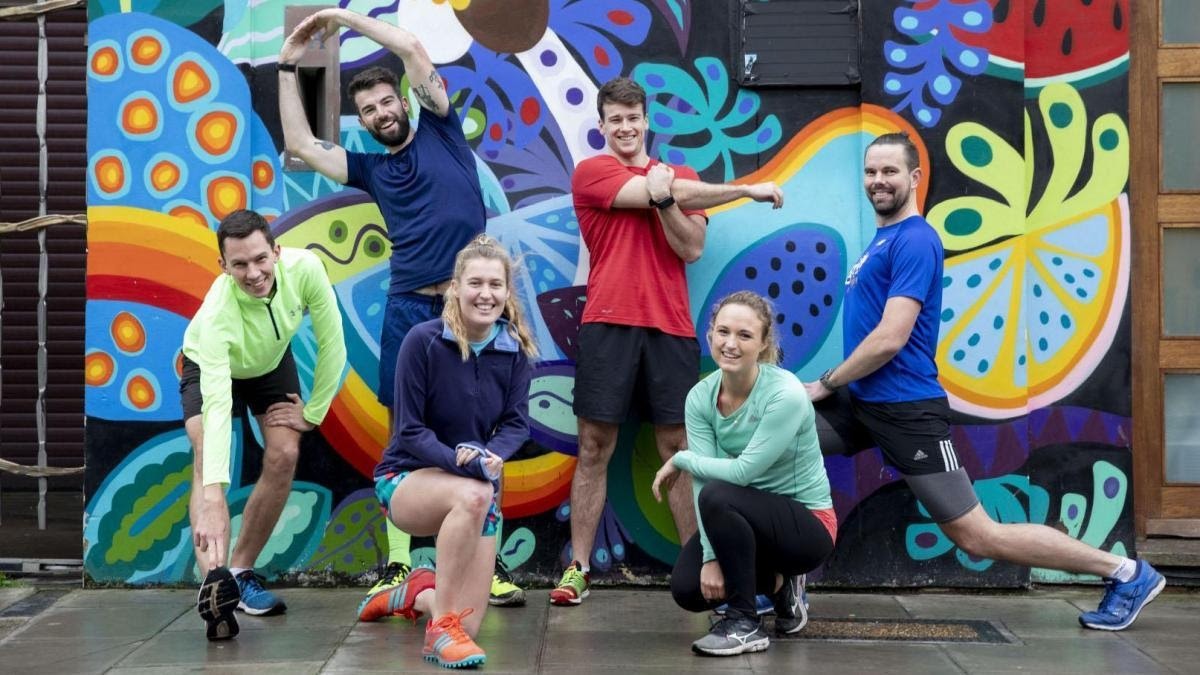
Warming up together for a run at MVF
VICKI COUCHMAN
The Sunday Times Best Companies to Work For 2020 lists are derived from the views of their employees. They ranked their organisations chiefly by eight key indicators, or “factors”, of staff engagement. The research and data analysis is carried out for The Sunday Times by Best Companies Ltd.
Eligibility
Organisations have to be at least three years old to be eligible. Those with 250-2,000 employees entered the 100 Best Companies to Work For list, and those with more than 2,000 staff entered the 25 Best Big Companies to Work For list. Firms with 50 to 250 staff entered for the 100 Best Small Companies to Work For.
Public-sector organisations, charities and other not-for-profits of any size are covered by the 100 Best Not-For-Profit Organisations to Work For. Find all these lists with full scores and extended company profiles at thesundaytimes.co.uk/best100companies.
Entries
Organisations register at b.co.uk to compete for a place on one of the lists.
Employee input
The views of employees were gathered across all participating companies and organisations. Surveys were distributed to a randomly selected group of staff in each firm, or to all staff in the small companies. At least 40% of these (30% for big companies) had to be returned. The survey contained 70 questions, measuring the eight equally weighted workplace “factors” identified from research within the UK.
This research demonstrates each respondent’s experience of their workplace through their perceptions of: Leadership (the heads and senior managers of the company); My Manager (the local management on a day-to-day basis); Personal Growth (opportunities to learn skills and advance); Wellbeing (balancing work-life issues); My Team (immediate colleagues); Giving Something Back (giving back to society and to the community);
My Company (the company and the way it treats staff); and Fair Deal (pay and benefits). These elements were used to determine the final rankings.
Company input
A detailed company survey sought data on policies (pay, maternity, benefits, healthcare, etc); processes (promotion, recruitment, communication, etc); and facilities (sports, training, catering, family-friendly hours, etc). These are represented on each company profile by icons.
Scoring
The marks gained from the employee survey determine the overall company rankings.
Statistics
Percentage results on individual questions from our survey are reported in tables, features and individual company profiles. In all profiles, these represent the percentage of the maximum possible score on each question and are expressed as the “percentage positive score”.
Employees responded to each statement by indicating their level of agreement on a seven-point scale ranging from “strongly disagree” (1) to “strongly agree” (7). These were averaged and turned into percentages of the maximum score.
For example, if a company gets a 67% positive score on the statement “My team is fun to work with”, this means its overall mark is 67% of the maximum possible score it could have had if all its staff had indicated that they strongly agreed with the statement.
THE LEAGUE TABLE
■ The staff figures include full-time and part-time workers.
■ The number of sites from which the business operates covers the UK only.
■ Revenues and pre-tax profit data are published from the most recent year available where firms were willing for them to be disclosed.
■ The stars in the columns on the right of the table are given to the 25 companies that performed best in each of the eight survey “factors” listed at the top of the columns.
HOW WE RANKED THE WINNERS: THE PROFILES EXPLAINED
Top scores
These are the company’s three highest-ranking scores among the eight “factors” surveyed in questionnaires filled in by its employees. They are expressed in terms of how the firm scores for each factor compared with all the firms in the list. This survey drives the overall company rankings.
The eight factors, explained in the panel below, are Leadership, My Manager, My Company, My Team, Giving Something Back, Wellbeing, Fair Deal and Personal Growth. Each organisation’s databox contains its three highest-ranking scores out of the above categories, derived from the survey data collected in autumn 2019.
Company data
Male/female ratio
Percentage split between the sexes among full-time and part-time staff.
Average age
Based on ages of full-time and part-time employees in September 2019.
Voluntary leavers
Percentage of the workforce who voluntarily left the organisation in the year to September 2019. In some sectors this can look very high while meeting or improving on industry norms.
Earning £35,000
Percentage of the workforce with gross income of more than £35,000 a year. The legal, financial, technology and media sectors tend to have the most high-earning staff.
Icons
Each company profile includes icons that show which firms offer the best provision in terms of perks, pensions and equal opportunities, and those that are rewarded with the most long-serving and charitable staff. See at a glance which companies offer the biggest range of employees’ favourite workplace perks.
Holidays
Companies that give a minimum of 26 days’ annual leave to all employees or 28 for not-for-profit organisations
Maternity
Companies offering at least 10 weeks on full pay or a generous alternative
Family-friendly
School-hours contracts offered to all
Management
Companies where at least 40% of the senior managers are women
Long service
Companies where at least 40% of the staff have worked for more than five years
Profit-related pay
Companies where profit-related pay is available to all employees
Pensions
Final-salary or non-contributory scheme offered to all, or the employer puts in at least 5%
Health insurance
Offered to all employees
Gym
Companies that have a gym on site or offer subsidised gym membership to all staff
Development
Companies that provide support for all employees undertaking training unrelated to work
Charitable activities
At least 40% of staff undertake charitable activities during business hours without incurring financial loss
ACKNOWLEDGEMENTS
For Best Companies Ltd
Jonathan Austin, Ian Dennis, Glenn Dimelow, Abbie Davies, Alan Kell, Alun Jones, Amy Maryniak, Andrew Rogers, Andrew Scattergood, Anna Pickard, Anthony Webb, Beccy Martin, Becky Jones, Catherine Andrew, Ceri Hoppe, Charlotte Evans, Cheryl Griffiths, Christopher Vardon, Claire Andrews, Clare Davies, Dan Hooton, Dani Lush Stradling, Ellie Dowsett, Emma Evans, Emma Jones, Gareth Blain, Gareth Wright, Garry Stone, Georgia Cole, Hannah Haworth, Hannah Robson-Davies, Hayley Norton, Heather Connolly, Heather Ryan, Heloise Simkiss, Jack Bookham, James Austin, Jamie Moffatt, John Corker, Jonathan Hart, Josh Hodgkiss, Julio Behambari, Kate Jones, Keith Rickett, Leigh Jenkins, Lewis Long, Liam William, Liz Edwards, Lorraine Parry, Louise Smith, Luke Martin, Mahdi Ahmed, Martin Howe, Matt Carter, Matt Pilkington, Michael Barnett, Molly Wilkinson, Natasha Girard, Nikita Jain, Oliver Stokes, Rachel Menkin, Rich Jones, Richard A Jones, Rob Griffiths, Rob Hill, Ruth Hankey, Sam Beaven, Sam Williams, Sheila Edwards, Sophie Blinkhorn, Sophie Kavanagh, Sophie Ross, Sophie Tunstall, Sou-Ting Chiu, Stacey Roberts, Stephen Hart, Tim Taleifeh, Warren Phillips, Zoe Griffiths
Best Big Company to work for 2020

Childbase Partnership
Staff enjoy quality training and a slice of the profits

Childbase’s Emma Rooney started out as an early years practitioner
JOHN LAWRENCE
As it does with most things, size matters in employee engagement. Creating motivated and productive workforces in a 50-strong firm — where everyone believes in a shared company vision and how their contribution to it counts — is one thing. Replicating that level of good feeling and purpose across thousands of employees in multiple, often geographically disparate sites is quite another. Which is why special praise should be reserved for the 25 Best Big Companies to Work For.
Topping our 2020 list of organisations with upwards of 2,000 staff is Childbase Partnership, a chain of 43 day nurseries across the south of England. Tending to the demands of pre-schoolers in a traditionally low-paid sector might not be everyone’s idea of a dream job, but Childbase employees are extraordinarily engaged with their work. The company came first in five of the eight factors of workplace engagement our survey measures: Leadership, My Company, Personal Growth, Fair Deal and Giving Something Back.
Central to Childbase’s appeal is that it offers much more than just a job, explains managing director Emma Rooney: “We want our colleagues to be recognised as professional educators of the very young with exceptional pay, benefits and career development opportunities.”
At its heart is an egalitarian approach to business: Childbase is entirely employee-owned, and makes a strong case for the power of profit sharing. Even though almost all (93%) of the workforce earns under £25,000 a year, at no other big company are people happier with their pay and benefits, our survey revealed.
Contributing to this sense of contentment is the dividend everyone gets each year, which is shared equally according to hours worked. All full-time staff received £1,000 this year.
“I get the same as anyone else in the business and so does the chair,” explains Rooney, referring to Mike Thompson, Childbase’s founder, now its chairman. Fuelled by his belief that “success is never about the few and always about the many”, Thompson began gradually transferring his family-owned firm to its employees in 2000, completing the process in 2017.
Staff are now motivated, Rooney says, by “feeling part of something, and feeling they have a voice. It’s not just about co-operation, it’s about partnership and that deeper feeling of ‘I’m listened to’.”
Forums for employees’ voices to be heard include a partnership council of 44 staff representatives who report ideas from the nurseries to senior management.
“In this highly regulated sector you can feel like innovation, creativity and thinking outside the box are stifled, so we give people avenues to make sure they have a voice,” says Rooney.
Not every suggestion is slavishly acted upon. “We can’t do everything,” she notes, “but it’s about understanding why something’s not feasible, showing we’ve thought about it, we’ve looked into it, we’ve listened — that’s important.”

James Cilia and Miles play at Childbase’s Cherry Trees nursery
JOHN LAWRENCE
Ambition is fostered and nursery practitioners are encouraged to stretch their skills, such as specialising in areas like Stem (science, technology, engineering and maths) experiments for young learners. Dedicated training courses range from apprentice to management level along with mentoring, on-the-job coaching and role modelling. “It is about growing our own,” Rooney explains.
Fun and games are not only for their young charges, and employees enjoy social gatherings such as days out to theme parks. “You can never underestimate what real engagement does to a business,” says Rooney. “It helps with profitability, and when you have a happy and engaged workforce you see less absenteeism. Our retention has improved by 3% on the previous year, which is fantastic.”
Childbase has seen off stiff competition from other Best Big Companies to Work For, such as last year’s winner, Admiral Group, the Cardiff-based insurer in third place this year. Ranking second is Coventry Building Society, which operates from 76 sites, with a headcount of 2,641. One of its strengths is the high level of community involvement staff contribute to at work — an area that has seen huge growth over the 20 years we have been publishing our lists.
MVF tops the 100 mid-size Best Companies to Work For 2020 list
People power can take a firm to the top

Michael Teixeira of MVF uses ‘puppy therapy’ to boost wellbeing for colleagues
VICKI COUCHMAN
At MVF, the London-based tech marketing firm that tops our mid-size (250-2,000 employees) Best Companies list this year, chief executive Michael Teixeira makes no bones about the value of staff engagement to the bottom line. “Of course, we think the two things are related,” he says. “By having a great environment where people love coming to work, the company performs better — and we do make more money.”
The lengths MVF goes to for its employees are pretty extraordinary, even by Best Companies to Work For standards. When the firm hits its targets, the entire workforce earns a celebratory trip to Ibiza, where they party, do yoga, cycle and chill by the pool. This excursion to the Balearics was easy enough to organise when the firm numbered 100, but even as the headcount has swelled to nearly 500, it is still part of the picture.
“Every business has aims and objectives,” Teixeira says, “but being able to use the carrot rather than the stick to get people behind our goals is brilliant. It’s also just nicer — it makes us all happier. So you’ve got the double benefit of it being good for business and good for us as human beings.”
The Ibiza shindig is just one of many perks at MVF. At the firm’s exposed-brick offices in Kentish Town, north London (soon to be vacated in favour of a larger space located in the Old Street tech hub), an on-site Zen room is designated for employees’ spiritual and mental health. Wellbeing sessions have included meditation, guided drumming and even “puppy therapy” — playtime with puppies in the office, resulting in warm feelings all round. Staff mental health is prioritised via trained first aiders who work across the business.
The kitchen at MVF stocks the kind of breakfast you might find in an on-trend cafe — fresh sourdough bread, chia seeds and nine types of milk — and there is a vast range of subsidised clubs for lunchtimes and after work, including personal training, boxing, choir and drawing.
More important than the fringe benefits, says Teixeira, is the opportunity that is implicit within a job here. “One of the things that really differentiates us is how quickly people can learn and develop and grow here.” A lot of MVFers (as they are known) are in their first graduate job, or have worked for just a year elsewhere.
“We’ve got people who are still in their twenties who have an astonishing amount of responsibility, not only in terms of direct reports but in terms of the kind of domains that they run,” says Teixeira. “Of our managing directors, pretty much all of them are home-grown. By design we give people a lot of autonomy, we help them.”
There is scaffolding to support promotions, including a six-month Management Development Academy training course. In addition, each employee receives a £1,000 annual budget to invest in activities to boost their professional growth.
“We are a people-based company, and it’s voted for by our people,” Teixeira says of MVF’s Best Companies top ranking, “so I think it’s a massive endorsement that we’ve created the right culture and values.”
The firm’s success with its staff is matched commercially. It has previously topped The Sunday Times Tech Track 100, which ranks UK private technology companies with the fastest-growing sales, and has earned two Queen’s Awards for Enterprise. A US office has opened and an Asian outpost is in the pipeline. The plan is “to grow organically by 20% or 30% a year”, accelerated by buying smaller companies. “We’re not resting on our laurels,” says Teixeira. “We’ve got work to do.”
When speaking to investors, Teixeira emphasises MVF’s people element which has “resonated really well”, he notes. “People pick up on this as something that’s unique and special about MVF, particularly in the markets we work in which are extremely competitive for marketing and tech talent. People recognise not only that we’ve created something that’s great today but something we can sustain, because of the things we are consciously doing and the sort of environment that we’ve created. Does it translate into investors having more appetite? I think so.”
MOD Pizza is a new entry to the Best Companies list this year. The Seattle-founded fast-casual restaurant chain was launched in the UK four years ago by former Carphone Warehouse entrepreneur Sir Charles Dunstone and his business partner, Roger Taylor. There is no limit to the number of different toppings customers can add to their pizzas for a flat price, and a similarly egalitarian approach applies to employees’ wages: everyone starts on £9.20 per hour regardless of their age or experience, against the national minimum of £8.21 or £6.15 under the age of 21 (rising to £8.72 and £6.45 in April).

John Nelson of MOD Pizza
LORNE CAMPBELL/GUZELIAN
“It’s a false economy to pay the national minimum wage,” declares John Nelson, MOD Pizza’s UK chief executive, “because the turnover in hospitality [staff] is incredibly high, especially in London, so if you can pay a fair wage you retain people — they won’t cross the road for an extra 30 or 40 pence, because they are already being paid and looked after. Then you get skilled and passionate individuals who know what they’re doing, who are worth their weight in gold.”
Staff at MOD Pizza feel better paid than at any other mid-size firm, and the company topped the Fair Deal factor of our survey. “We pride ourselves on feeding people, looking after people — it’s all part of the gig, we give everyone their birthdays off. And we have as much fun as is humanly possible, we don’t take ourselves too seriously — it’s only pizza, nobody’s curing any diseases, it’s hospitality,” says Nelson, beaming.
Brightstar Financial leads the Best Small Companies to Work For 2020 list
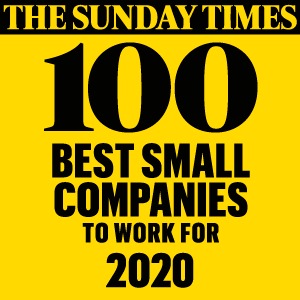
Treat employees right and they will reward you with higher productivity

Clare and Rob Jupp head the list with their firm Brightstar
TOM STOCKILL
If there’s a formula for running a successful small company, husband-and-wife team Rob and Clare Jupp may just be close to cracking it. The couple run Brightstar Financial, which tops The Sunday Times 100 Best Small Companies to Work For list for the second year running.
Last year’s win was, says Rob, a “massive shock”. This year’s victory will no doubt be another surprise to the Jupps — but their accomplishment is no fluke.
The mortgage specialist, based at Billericay in Essex with branches in London and Manchester, has 58 employees. Rob set up the firm in 2011, and the unexpected death of Clare’s sister six months into the venture intensified the couple’s resolve to create an environment where people feel cared for and valued. “One thing that is certain about life is the uncertainty of it,” says Rob.
Clare, whose official title is director of people, came on board in 2014 following maternity leave. The couple often refer to the “Brightstar family” — “we look after each other, we value each other. We know and understand everyone as an individual,” says Clare. Half of all new hires come via personal recommendations. Developing people who are a cultural fit is more important than previous experience, she adds.
“CVs came in the morning after we won the Best Companies award. That was really unexpected,” says Rob; they hired one person as a direct result. Winning last year also seems to have helped retain staff; only one person has left in that time — no small achievement given that the company is based just 30 minutes from the bright lights of London.
Leading by example is something Clare and Rob prioritise. They are open about their own struggles with mental health, and consequently focus on their colleagues’ welfare. “We are very fallible, vulnerable people ourselves,” says Rob. “We understand that people have bad days, and that they’re not machines.”
Brightstar has increased its score for Wellbeing — one of the eight factors that our survey measures — by 6.5% year on year. Measures to help staff manage stress levels include a wellbeing room at head office and trained mental health first-aiders. “We’ve adopted the whole ‘it’s OK to not be OK’ approach — that means people feel comfortable being open about their own problems,” says Clare. The couple have two children, and understand what Rob describes as the “horrifically difficult balancing act” of work and home life, so flexible working is available to anyone who needs it.
Another area of improvement at Brightstar is Fair Deal: how happy staff are with their pay and benefits. This might seem surprising given that only 19% of the workforce received a pay rise last year. “At face value, it looks like we’re a bit tight,” agrees Rob. “But a better way of asking that question would be, ‘what percentage of your staff increased their remuneration for 2018-19?’ And I’d say, all of them.” Performance-related pay and monthly bonuses have seen to that, with customer service staff, for example, incentivised by a “Five for Five” scheme which rewards them with £5 every time they get a five star Trustpilot review. “I’m mindful that if people ask for a pay rise, then we haven’t done our job correctly,” says Rob.
The Jupps also challenge what Rob calls the “institutional sexism” of financial services. The company recently added a clause to all job advertisements specifically encouraging women to apply, even if they don’t “[tick] every box on the criteria list”, and stating the firm’s openness to flexible working requests. They subsequently received three times as many female applicants for a consultancy role as the previous time they advertised to fill a similar job.
Across the business, eight managers are women against three men. While there are 60% men to 40% women overall, Brightstar has eradicated its median gender pay gap — it was 12% in 2018 — and the company spends time promoting financial services as a career to schoolchildren, particularly girls. “We can’t change what’s already there,” says Clare. “But we can change the future.”
All in all, last year was a good year at Brightstar — and the accounts back that up: profits before tax were up by 24% on 2018– 19 and turnover increased by 9.7% to almost £10m.
Jonathan Austin, the founder and chief executive of Best Companies Ltd, which compiles the lists for The Sunday Times, says the firm has been top Best Small Company twice running for very good reasons: “They’re ticking all the boxes not from a cynical perspective, but because they recognise that these things matter,” he says. He also notes that small companies — those with between 50 and 250 employees — are in an advantageous position when it comes to engaging staff. “They don’t have the same sort of challenges as larger companies around communication and coming together,” he says. “[Employees] feel connected to the senior leaders — that’s better than feeling like a small cog in a big machine.”
James Davidson, the co-founder of Tails.com, a dog food subscription service based in Richmond upon Thames, understands the importance of employee engagement. Appropriately, his staff head out with their dogs for lunchtime walks in the neighbouring park. “When people are enjoying their work they do their best — and having a bit of fun in the workplace helps that,” says Davidson, who adds that people are more productive when they take breaks — especially in the form of dog walks, which have the added bonus of helping colleagues bond with each other. “I think it makes for a healthier day, and that increases productivity,” he says.

James Davidson and dog-loving colleagues at Tails.com
VICKI COUCHMAN
“Organisations are only as good as the employees they’ve got,” says Austin. “It is an impossibility to get sustainable business results without engaging your people first.”
Additional reporting by Jo Gunston
Stockport Homes named UK’s Best Not-For-Profit Organisation to Work For

Successful leadership is based on sharing your vision and earning the workforce’s trust
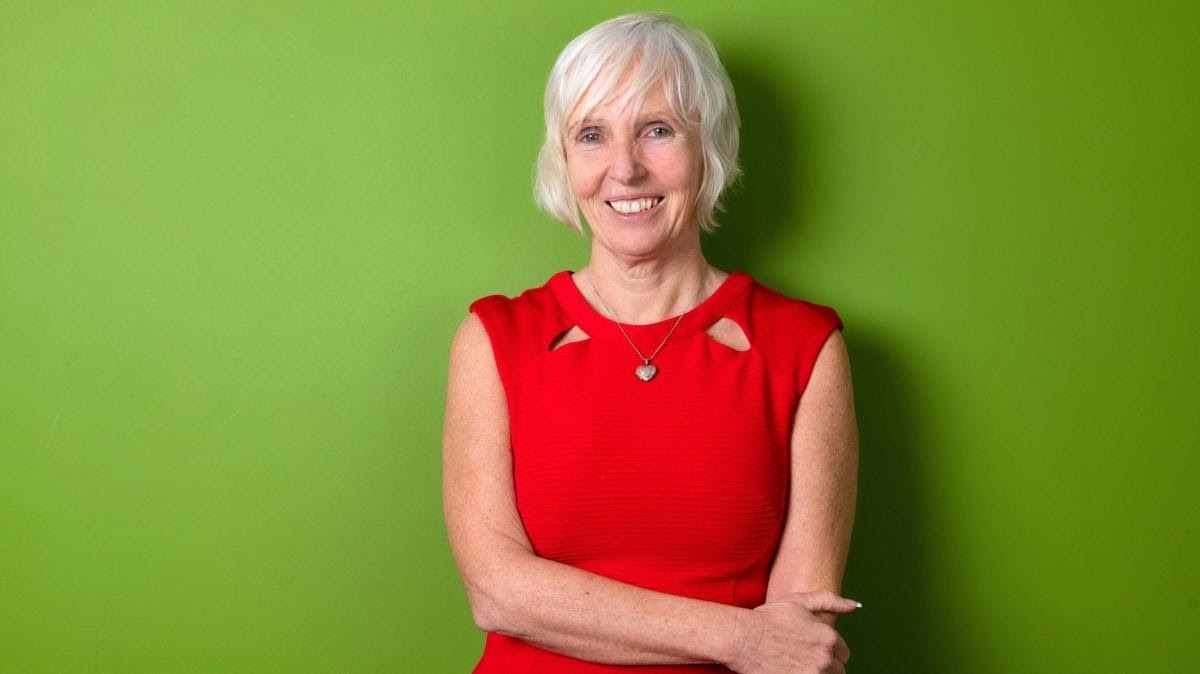
Helen McHale has grown Stockport Homes
PAUL COOPER
When Helen McHale became responsible for housing at Stockport Council in 2001, she inherited a failing service, demoralised staff, and tenants who were resistant to the planned transfer of 11,500 homes to an arms-length management organisation.
“We had to go from not having a good service to finding a way to get the investment we needed, so we had to work with tenants and gain their trust,” says McHale, who raised the bar for employees and residents, setting up Stockport Homes four years later.
Now one of the highest performing housing providers in the country, it is Britain’s Best Not-For-Profit Organisation to Work For, according to our survey of almost 42,000 people working for charities, housing associations and other not-for-profit organisations.
“As a chief executive you have to have a vision, be clear what it is about and why, and sell it, and you have to be engaged with people,” explains McHale.
Stockport Homes, which manages 500 of its own properties as well as those belonging to the council, provides services including employment training and financial advice. It has also helped establish five community food stores and is part of a Greater Manchester initiative to tackle homelessness.
“It is one of the most polarised boroughs in the country and we have to do something about reducing inequality. If we can’t do it in Stockport, we can’t do it anywhere,” says McHale, who knows that to achieve this and the organisation’s “one team, transforming lives” mission, she needs the 622-strong workforce on message and motivated.
Openness and authenticity are essential, says McHale. “You have to be genuine, so Helen McHale the human being lives this job as well,” she says. “It’s not just something I do to earn money.”
McHale goes on the weekly wellness walks when her diary allows and to all the social events, informal settings where she picks up on staff concerns. She also leads by example on charity events from climbing Ben Nevis to doing a sponsored parachute jump. “You will find good relationships here,” she adds.
The organisation, which has seen turnover rise from under £11m to £50m on McHale’s watch, keeps staff engaged with policies that include flexible working options and opportunities for employees to run in-house workshops on issues such as universal credit and safeguarding, saving £20,000 a year on commissioning external providers.
“We need to have the best employment practices to get the best service for our customers,” says McHale, who responded to government cuts not by making redundancies but by tapping into her team’s skills and growing the organisation’s way out of austerity. This included forming the Stockport Homes Group, which incorporates a construction company and a charitable foundation.
“People come to work for us because they hear we are a good place and they want to be part of it,” she says.
The Eden Project, an environmental visitor attraction and educational charity in Cornwall, put itself under scrutiny for our Not-For-Profits list this year (it came in at No 81), partly to find out how its staff feel about their working life and to see what it could do better.
“We feel excited to be at a level where across a range of benchmarks we seem to be doing OK,” says Sir Tim Smit, co-founder and executive vice-chair. “It reminds me of my days in the music business,” adds Smit, a former hit songwriter. “You have no idea whether you’re a contender and then, when your record goes into the Billboard 100, you suddenly realise who is better than you, what you’re competing against.”
Since opening in 2001, the project has attracted more than 20 million visitors and contributed more than £2bn to the Cornish economy. “We are all hugely aware that the foundations of our success are on the hard work and honest labours of our colleagues, and anybody who thinks it’s our poncey high thoughts has got another think coming,” he says.
Staff can apply for financial support towards development activities, which have included a research trip to Borneo. The dog-friendly office, meditation and yoga classes reflect Eden’s focus on wellbeing, which extends beyond the workforce to include offering therapeutic horticulture programmes for people with physical or mental health problems.
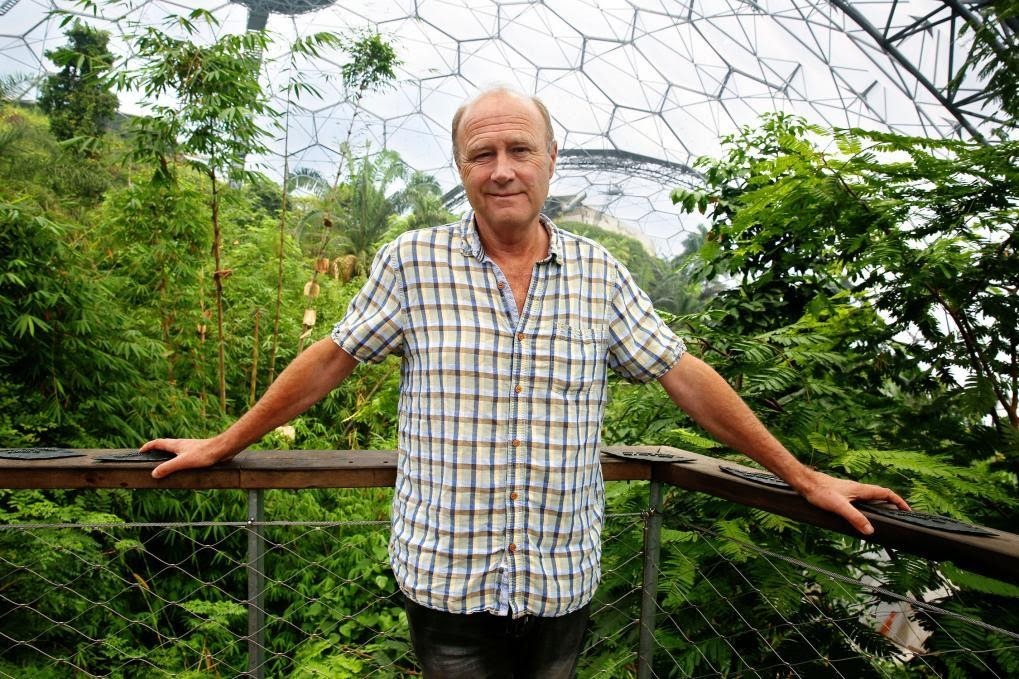
Sir Tim Smit of the Eden Project wants to ensure that employees feel fulfilled
“The single thing that would make me most proud, other than the fact that Eden affects something which changes the world through personal behaviours, is that the gang that makes Eden Eden is happy, treat each other well, and feel fulfilled,” Smit says. “If Eden had a really unhappy team, it would fly in the face of everything we were saying in terms of what we were trying to change.”
Best Companies to Work For special awards 2020
Our winners create unique opportunities and work environments
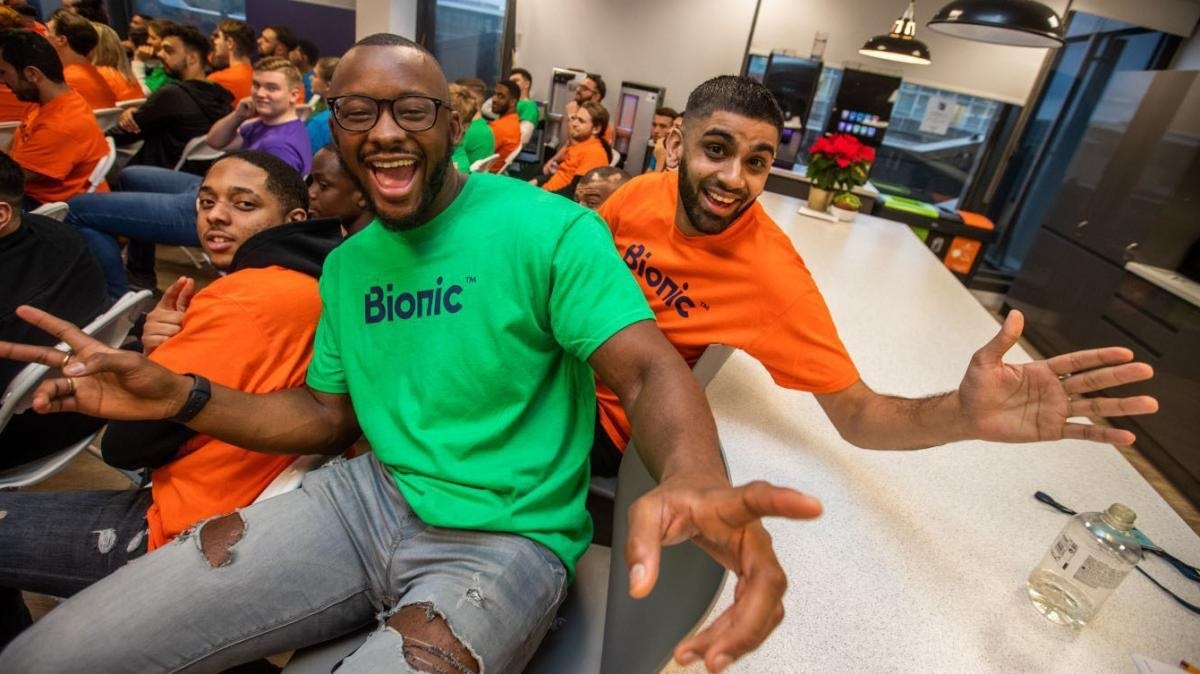
Staff ideas are taken seriously at the comparison site Bionic
BLACK EDGE PRODUCTIONS
Innovation in Engagement
HAWKSMOOR
Presented by Best Companies
Playful thinking and crazy ingredients were in the mix when a selection from its 652-strong workforce came together to revitalise the cocktail menu at steakhouse chain Hawksmoor last year. Top bartenders usually create new drinks for the London-based firm, but this time more than 40 staff from all levels were involved.
Some disastrous concoctions provided plenty of amusement, while innovative cocktails such as the fir-tree-needle-infused Douglas Fir Silver Bullet made the cut.
An online collaboration tool facilitated team engagement and employees across the nine-site operation felt more involved in the process because they knew the stories behind each drink.
Giving Something Back
BEAVERBROOKS THE JEWELLERS
Presented by Best Companies
In its centenary year, Beaverbrooks focused on its primary purpose of “enriching lives”. The jewellery and watch retailer, based in Lytham St Annes, Lancashire, gives back through its charitable trust, which has donated about £14m to more than 750 good causes since launching in 2000.
The 72-site organisation already matches money raised by its 919-strong workforce, but last year it double-matched their contributions. Nearly half the employees donate via a payroll giving scheme, which raised £193,000 for charity last year.
Staff also have two days a year to volunteer during working time, helping charities such as the youth homeless trust Streetlife.
Learning and Development
MVF
Presented by Best Companies
MVF Fest is the annual learning festival hosted by the London-based business services firm. Nicknamed the Ultimate Learning Festival, it showcases examples of work from across the four-site organisation to colleagues, as well as highlighting errors to avoid.
Hosted at Arsenal’s Emirates Stadium, last year’s festival included 23 talks by 38 speakers before concluding with a social evening for the 411-strong workforce.
Personal development is also encouraged less formally via the clubs and activities on offer within the business. The company choir, for example, promotes teamwork, communication and project skills in a fun and engaging way.
Wellbeing
SKY BETTING & GAMING
Presented by Best Companies
A “wellbeing passport” is provided to any member of the 1,318-strong workforce at Sky Betting & Gaming who needs additional support at work. It eases discussions between employees and managers across the five sites of the Leeds-based online gambling firm to encourage wellbeing and make any adjustments required.
The passport also ensures there is a record of any agreements made, which minimises the need to renegotiate when a person changes jobs, is relocated or assigned a new manager. Staff who use the passport include those with a disability or long-term medical condition, those struggling with mental-health issues and parents with young children.
Discovering Potential
COOK
Presented by Best Companies
People who have been in prison, homeless, struggled with addiction or had long-term mental-health challenges are helped into work by COOK’s RAW Talent scheme. The firm, based in Sittingbourne, Kent, delivers frozen meals prepared by company chefs to customers’ doors. It has a strong record of providing jobs in its 1,081-strong workforce for those from vulnerable communities.
RAW Talent has been operating for five years. It offers extra support such as an introductory chat before each job interview and the provision of work coaches to those who might need them. Fourteen people have been hired through RAW Talent in the past 12 months.
Best Leader
BEAVERBROOKS THE JEWELLERS
Presented by Best Companies
One hundred years ago Mark Adlestone’s grandfather, Isaac, founded Beaverbrooks with his two brothers. Family values are still strong at the Lancashire-based jewellery and watch retailer, which employs 919 people across 72 sites. Adlestone, the firm’s chairman, and its managing director Anna Blackburn lead its efforts to make a positive difference to the wider community. The pair have combined with local leaders to push forward regeneration projects in the Blackpool area.
Tackling homelessness is another focus, with Blackburn joining colleagues on a volunteer rota to prepare and deliver hot meals to young homeless people.
Best Improver
BIONIC
Presented by Best Companies
“Something I have helped to create feels much better than something I have been briefed on,” is feedback from one staff member at London-based Bionic, a business utilities comparison site. Its 320 employees were asked to contribute ideas to the firm’s restructure, and responded with some brilliant ideas ranging from cheaper deals for SMEs to a digital platform. They also drafted new values to encapsulate the company’s approach, including “one team” and “push for greatness”. The positive results are reflected in figures that show a 47% leap in turnover to £32.8m for the year ending March 2019.
SPECIAL AWARDS FOR BIG COMPANIES
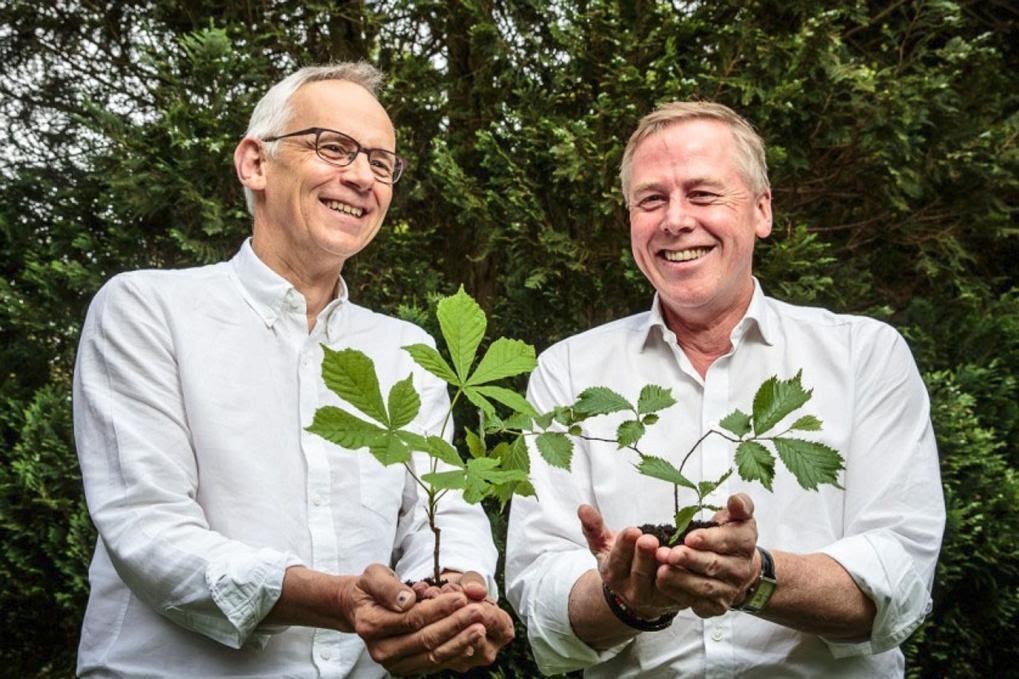
Skipton chairman Robert East and chief executive David Cutter plant trees
DANNY PAYNE
Learning and Development
SKIPTON BUILDING SOCIETY
Presented by Best Companies
Former barman Robert Woolmer didn’t think he was “techy” enough to apply for a job at the financial services provider Skipton Building Society. Employees from the IT team who frequented his bar encouraged him to apply.
“They explained I didn’t need to be techy at all,” says the IT solutions delivery specialist, who joined the 89-site enterprise in 2007. “I learnt on the job and just kept going,” adds Bradford-based Woolmer, whose career journey features on the organisation’s Meet Our Colleagues website page.
The 2,235 employees at the UK’s fourth largest building society, which provides mortgages, savings and financial advice to more than one million members, are encouraged to take responsibility for their own development. Managers chat with individuals about their objectives before agreeing a development plan with them. They can then learn at their own pace via a blended approach of classroom-based courses, mentoring and social learning.
Two or three individuals are supported annually to study for an MSc in strategic leadership, an apprenticeship programme the Skipton helped to develop for the building society sector with Loughborough University. The enterprise spent £1.5m on training last year and currently 188 colleagues are being supported financially and time-wise to undertake qualifications.
Education doesn’t just happen in the classroom, however. Members of the management team have taken part in experiential sessions, which have included working with horses to gain greater empathy; partnering with West Yorkshire police to find out about their decision-making processes; and working with community organisations such as refugee charities to learn about leadership in a different context.
Volunteering is another way the enterprise encourages personal development. Staff devote two days a year in work time to participating in initiatives such as a partnership with the Woodland Trust. The reasoning is that planting trees to mitigate the society’s carbon footprint encourages teamwork and horticultural skills.
Staff run 45-minute sessions open to all on their own fields of expertise, which have ranged from how to avoid fraudulent scams to lessons in Vietnamese cooking.
Employees consider the experience they gain from their job is valuable for their future, a 77% positive score, ranking sixth on our Best Big Companies to Work For list. They also believe that working here is good for their own personal growth (71%, ninth) and the training they receive is of great benefit to them personally (67%).
OTHER SPECIAL AWARDS
Innovation in Engagement
Admiral Group
Discovering Potential
UK Power Networks
Giving Something Back
Howdens
Wellbeing
Tata Consultancy Services
Best Leader
Mike Thompson (Childbase Partnership)
Best Improver
Childbase Partnership
View all of the Best Companies to Work For lists online at thesundaytimes.co.uk/best100companies
BEST SMALL COMPANIES SPECIAL AWARDS

Brightstar Financial’s Rob and Claire Jupp know and understand their staff
TOM STOCKILL
Innovation in Engagement
BRIGHTSTAR
Presented by Best Companies
Loyalty is rewarded at this mortgage specialist: everybody becomes a partner after five years on the payroll, in recognition of their “commitment and hard work”, says director of people development Clare Jupp. Partners at the business, based in Billericay, Essex, get share options and help make strategic decisions. “They are fantastic role models,” she adds.
Giving Something Back
JTP
Presented by Best Companies
This London architectural practice works with the Stephen Lawrence Charitable Trust to offer work experience to underrepresented groups. It has designed a school in Richmond pro bono for Small Steps, a charity that supports physically disabled children. Staff have also taken to guerrilla gardening beside a busy road.
Learning and Development
SF RECRUITMENT
Presented by Best Companies
Everyone at this Nottingham recruitment firm has Lego bricks on their desk to remind them of their psychological profile, identified in tests at the completion of their training. The colour-coded bricks act as an aide-memoire to encourage self-awareness, critical thinking and better communication among the workforce.
Wellbeing
EQUILIBRIUM ASSET MANAGEMENT
Presented by Best Companies
Wellbeing is based on four pillars, according to this Cheshire wealth management company: physical, mental, financial and social. It offers meditation classes, massages and twice-weekly yoga sessions along with more energetic team events and group activities, and people are encouraged to eat together in the canteen. Financial clinics include advice on savings and pensions.
Discovering Potential
THAKEHAM
Presented by Best Companies
This West Sussex property developer imports transferable skills from the military into the construction industry via its “talent for development” scheme, under which former armed forces personnel join its training programme to learn about site management. A separate scheme gives unemployed people the skills and experience needed for permanent jobs in construction.
Best Leader
PLAN.COM
Presented by Best Companies
Dan Craddock, the chief executive of this Isle of Man mobile communications company, is described by one member of staff as “the most inspiring man you will ever meet”. He is always on hand to chat to people — both at work and socially — he’s approachable and staff feel free to ask himfor help or to suggest new possibilities for the business.
Best Improver
SMOOTHWALL
Presented by Best Companies
A new policy of encouraging individual managers and their teams to decide how best to take action in response to its regular staff surveys has reaped dividends at this Leeds-based operation, which advises schools on safeguarding children from the more harmful aspects of the internet. The firm believes that people are more likely to buy in to change if they have been part of the implementation process.
View all of the Best Companies to Work For lists online at thesundaytimes.co.uk/best100companies
BEST NOT-FOR-PROFIT ORGANISATIONS SPECIAL AWARDS
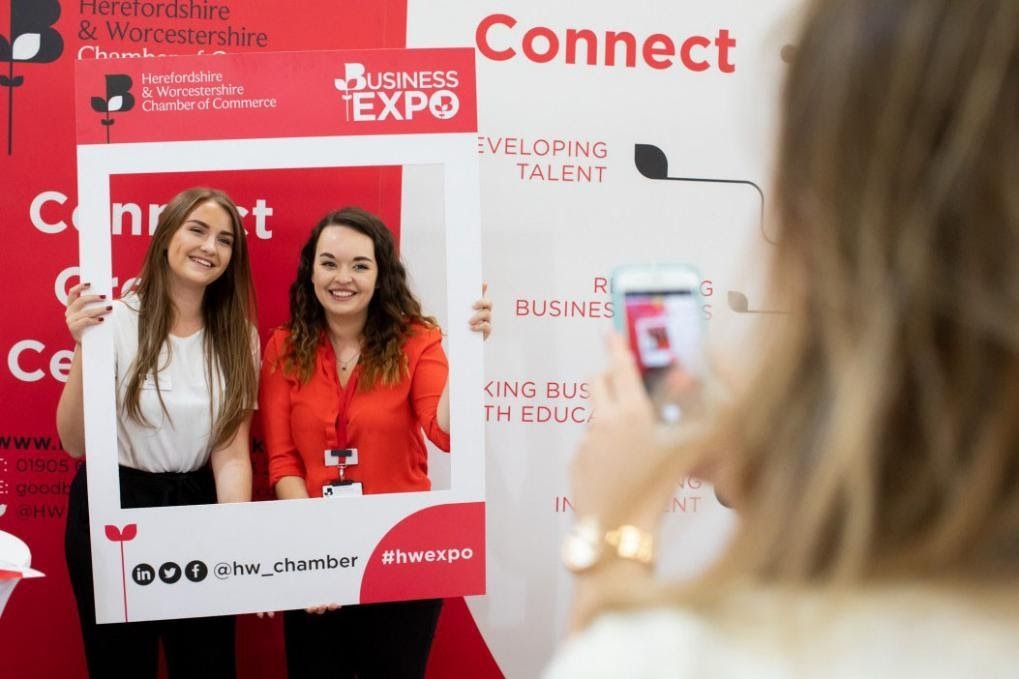
Herefordshire and Worcestershire Chamber of Commerce rank 20th overall
JAMES GREENOFF
Best Leader
YOUTH SPORT TRUST
Presented by Best Companies
Every month Ali Oliver, chief executive of this Loughborough-based sports charity, sends a letter of thanks to employees nominated for going the extra mile. Oliver, who gets involved in staff activities from panto sketches to yoga, organises an annual Easter egg hunt and delivers trays of mince pies and sherry to the team at Christmas.
Best Improver
HEREFORDSHIRE & WORCESTERSHIRE CHAMBER OF COMMERCE
Presented by Best Companies
This Worcester-based organisation has made impressive gains across all eight factors, resulting in a 73-place jump to rank 20th overall. The biggest improvement was for Personal Growth, with regular lunch ’n’ learn workshops, seminars and courses on offer to drive staff development.
Giving Something Back
TOUCHSTONE
Presented by Best Companies
This mental health and wellbeing charity in Leeds runs a monthly dementia cafe for older people of South Asian descent and has enabled a Little Free Library to be set up in its grounds. Its proactive Green Group has replaced single-use plastic cups, plates and cutlery, and staff held three clothes swaps last year.
Learning and Development
INSPIRE NORTH
Presented by Best Companies
All employees are encouraged to develop leadership skills through opportunities including shadowing and “acting up” at this mental health charity in Leeds, which also runs a skills-swap initiative across its services and with other organisations. A reverse mentoring programme has been introduced linking senior managers and trustees with staff from ethnic minority backgrounds.
Wellbeing
NAVIGO HEALTH AND SOCIAL CARE CIC
Presented by Best Companies
Blood pressure checks, diabetes risk scoring and monthly campaigns on issues such as quitting smoking, heart disease and inactivity at work help the 660 staff at this mental health services provider keep fit and healthy. The Grimsby-based social enterprise has its own in-house occupational health service.
Discovering Potential
TOUCHSTONE
Presented by Best Companies
Experience of mental health problems is a desirable criteria for all posts at this small mental health and wellbeing charity in Leeds, which has former service users among its staff, including in senior roles. Last year Touchstone recruited 10 ex-offenders or serving prisoners, including one doing a five-year sentence, and it helps people gain qualifications.
Innovation in Engagement
SHEPHERDS FRIENDLY
Presented by Best Companies
Spontaneity is encouraged at this small financial services provider based in Cheadle, Greater Manchester. Its Mutual Moments initiative, the brainchild of an employee, allows staff to use their own judgement on a gesture that can make a real difference to one of its customers, whether sending them a wedding card or a birthday cake. One member of staff won approbation from senior managers for dispatching a bottle of champagne and chocolates to a customer who had suffered a particularly bad week.
View all of the Best Companies to Work For lists online at thesundaytimes.co.uk/best100companies
Best Companies 2021
Does your organisation have what it takes to become a Best Company? To compete for a place on next year’s lists, register at b.co.uk/signupst